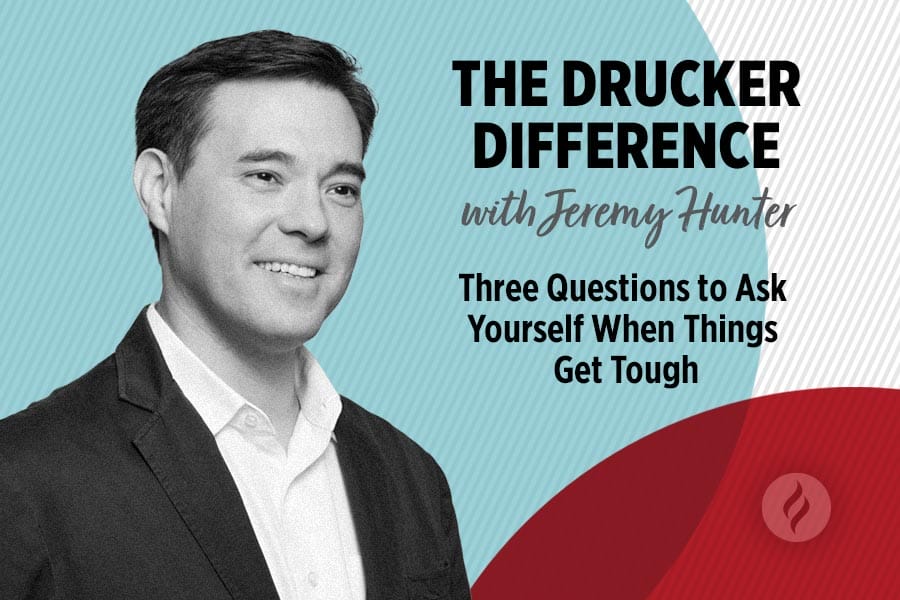The Drucker Difference: Three Questions to Ask Yourself When Things Get Tough

“You can’t manage other people unless you manage yourself first,” is a core Drucker dictum.
In times of disruption, when there aren’t easy or clear solutions in sight, effectively managing yourself becomes even more essential. Without first managing your internal state, you risk wasting time, energy, and effort into derailing actions that undermine results.
I know this firsthand after living with a potentially terminal illness for 17 years. Prioritizing managing what was going on inside me, the anxiety, frustration, grappling with mortal uncertainty, gave me solid ground to stand on in an otherwise uncontrollable situation. Here are some questions that helped me and form the backbone of what I teach in my Executive Mind courses at Claremont Graduate University’s Drucker School of Management:
What zone am I in right now?
Our nervous system is wired to respond to challenges in one of three ways.
In the Green Zone: You love being called to bring the best of yourself to the situation. You relish the thought of taking on a challenge and pushing yourself to new heights. It’s energizing and thrilling. In this zone, you can also feel calm, collected, and in control. You’re flexible, adaptive, and broad-minded. Your body is relaxed and responsive.
In the Red Zone: You are on high alert. This is the place of “fight or flight” where you are in a defensive, anxious, or aggressive state. Your mind is racing. You perceive threat everywhere and frame interactions as battles you must win. You become narrow and rigid. Your body is tight, contracted, and very likely in pain. You eat or drink to feel better.
In the Black Zone: You feel spent and have no energy. You ask yourself, “Why bother?” You have downshifted into depression, not wanting to see others, and apathy. Your body is limp or collapsed. You want to sleep forever. In extreme cases, you feel hopeless and lost.
The Red and Black zones are physiological extremes, meant only for short visits but not long-term occupancy. They exact heavy tolls on your body-mind. I have found the most effective responses are more physiological than psychological. Rest is always a good idea. However, in states of deep anxiety, that is difficult for many. In that case, you might consider breathing exercises or my personal favorite: cold showers to shift your nervous system activation. I like James Nestor’s book Breath: The New Science of a Lost Art as a helpful resource.
What am I giving my attention to?
Your attention is the primary conduit you use to relate to the world. Your world is largely what you attend to. Fixating on what’s going wrong, what could go wrong, and what’s wrong with the world will rarely lead you to a good place. In my case of living with disease, it was all too easy to get caught in a whirlpool of fear-driven scenarios. I made a deal with myself that I would not ignore the realities of the disease and take my medicine, follow my diet (mostly…), and exercise.
However, I made a conscious effort to put my attention on things that were life-giving, opportunity-oriented, and supportive. Drucker emphasized the importance of feeding opportunity and starving problems. By looking at what was strong, beautiful, and nourishing, I gave myself resources to build on.
What actions can I take right now?
After a cold shower, the best remedy for anxiety is action. “Planning” is not acting. Waiting for the perfect moment, when the stars are all harmoniously aligned, will never translate into movement. Consider what your intentions are and take one action in alignment with those intentions. Then do another one. Then another.
It could be the intention is to heal and rest, so you take yourself on a retreat. It could be the intention is to learn, so you sign up for a course. It could be the intention is to prepare yourself for a new future, so you systematically bring to closure unfinished business from your past.
The only way to get a new result is to take a new action.
There are many more questions you could ask yourself.
What am I resisting or resenting?
What past pain is hindering my forward movement?
Who supports me and what’s good right now?
But the three I discussed above are fundamental. They can unlock new pathways when the territory gets unclear. Managing yourself starts with managing your nervous system, what you give your energy to, and what actions you can take. This is where you can begin to make a difference for your present and future.
Jeremy Hunter is Associate Professor of Practice and the Founding Director of the Executive Mind Leadership Institute at Claremont Graduate University. He teaches courses on the practice of self-mastery and navigating transitions with a focus on accelerating a leader’s personal evolution so they can be more effective in a changing and challenging world.
More from The Drucker Difference: